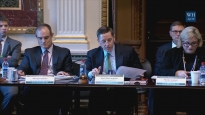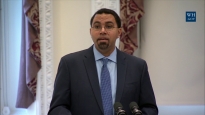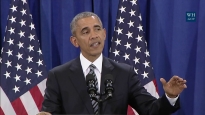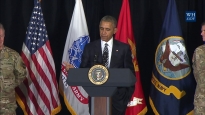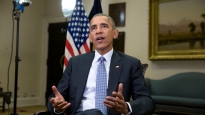President Obama Meets with General Colin Powell
December 01, 2010 | 11:14 | Public Domain
The President and General Colin Powell speak to the press after meeting in the Oval Office to discuss reducing school dropout rates, the importance of ratifying the new START treaty, and other issues.
Remarks by the President and General Colin Powell After Meeting
3:34 P.M. EST
THE PRESIDENT: I want to thank General Colin Powell for being here with me today. He is not only a great statesman and a great public servant, but also a great friend and a great counselor. And periodically I check in with him, and I know my entire team, including the Vice President, checks in with him, because he continues to have an unparalleled sense of our national security needs, and I think really taps into the best impulses of the American people.
The first thing that I want to do is I want to congratulate him and his wife Alma for the extraordinary work that he’s been doing with America’s Promise, which focuses on how can we finally get serious about education reform, because he understands, Alma understands and all of us understand that our kids are going to be competing not just against each other here in this country but they’re now competing worldwide.
And America’s Promise has been at the forefront on education reform. They just issued a report, “Building a Grad Nation,” that notes that we have made some progress over the last several years in reducing the number of dropout factories that we have around the country, that we are seeing a greater emphasis on kids staying in school, but we’ve still got a lot more work to do. And it’s going to require all of us -- parents, teachers, administrators, the public and private sector -- to make sure that we continue on this trend of improvement.
So thank you for the work you’re doing in that.
Most of the discussion we had was around national security issues. We talked about some of the challenges across the landscape, from North Korea to Iran to Afghanistan. But we spent, in particular, a lot of time talking about the START treaty. General Powell has been involved with just about every arms control treaty since there were arms control treaties. I hate to --
GENERAL POWELL: Not quite that long.
THE PRESIDENT: I hate to date him, but from the Reagan administration on, he has helped to shepherd through a variety of these arms control treaties, and the reason is, is because he understands, as so many others understand, that a world without binding U.S.-Russia arms control treaties is a more dangerous world.
And he and I discussed why START is so important. In the absence of START, without the New START treaty being ratified by the Senate, we do not have a verification mechanism to ensure that we know what the Russians are doing, and they don’t know what we’re doing. And when you have uncertainty in the area of nuclear weapons, that’s a much more dangerous world to live in.
We also discussed the fact that Russia has cooperated with us on critical issues to our national security like Iran sanctions, transit to supply our troops in Afghanistan, working on securing loose nuclear materials.
And the relationships and trust that are built from the New START treaty spill over into a whole host of other national security issues that are of vital importance to America.
So Colin is one of a number of former national security advisors, Secretaries of Defense, Secretaries of State -- from both Democratic and Republican administrations -- that have emphasized how important it is to get this done. And we discussed the fact that the Senate appropriately has a role in advice and consent, and it ultimately needs to ratify this treaty. That’s why we have made sure that we have had 18 separate hearings. We have answered over a thousand questions. We have offered to brief every single senator -- Republican and Democrat -- around these issues. But now it’s time to get this done.
I’m gratified by the leadership of the ranking Republican on the Senate Foreign Relations Committee, Richard Lugar, as well as the ranking Democrat, the chairman, John Kerry, for their extraordinary cooperation and work on this issue.
It is important for us to make sure that we complete the evaluation process, we finish the debate, and we go ahead and finish this up before the end of the year.
And so I just want to again thank General Powell for his good counsel, his friendship, most importantly his service to our country. And I very much appreciate the fact that he supports an effort that all of us should support in order to make America more safe.
GENERAL POWELL: Thank you very much, Mr. President. Let me begin by thanking you for your support of the America’s Promise Alliance and the Grad Nation effort. And also let me take this opportunity to thank Secretary of Education Arne Duncan for the great job that he is doing in making sure that our kids are ready for this 21st century world that is going to be so demanding.
The President noted the issues that we discussed with a particular focus on the New START treaty. I fully support this treaty and I hope that the Senate will give its advice and consent to the ratification of the treaty as soon as possible.
I have been involved, as the President noted, in arms control negotiations and the ratification of arms control negotiations and treaties for the last 25 years. And what is fascinating about this whole process to me is that 25 years ago, the Soviet Union and the United States each had an inventory of something like 28,000, 29,000 nuclear weapons. As a result of the arms control process and the end of the Cold War and change in the world situation, those numbers have been reduced by over 80 percent, so they’re down now under 10,000.
One of the reasons we were able to do this in a way that was transparent with both sides confident in the process was because of the arms control agreement -- whether it was INF Treaty or START I or START II that were ratified, the Moscow Treaty -- so many other treaties that came along to give us stability, to give us transparency, to give us visibility into what each side was doing. As a result of these treaties we have both benefited -- both the Russian Federation now and the United States of America, but the world has benefitted by having fewer of these horrible weapons in existence.
And we hope that we can continue this process. New START is important because it continues this process. And it’s especially important because at the end of last year, we lost the verification system that we had under START I. And this is the first time in all these years where we don’t have these procedures in place. So we’re not sure exactly what’s going on within the Russian Federation; they’re not exactly sure what’s going on in the United States of America.
And I think the most important feature of New START is to put in place the verification regime again. It will be a little different than the START I verification system, but it is more than adequate to make sure that we know what they are doing and they know what we are doing, and it has been so identified as being adequate by our intelligence community.
The number of warheads reduced is modest but nevertheless significant. It continues the downward trend. And so I fully support it.
And you’ll see tomorrow morning in -- hopefully in The Washington Post an op-ed piece signed by me, Secretary Shultz, Secretary Baker and Secretary Kissinger, former Secretaries, then former Secretary Eagleburger that once again shows we as a group of Republican former Secretaries of State believe that this treaty is in the best interest of the United States of America, best interest of the world and frankly the best interest of the Russian Federation.
A good treaty is one that both sides think they have benefited from, and that has been the history of arms control agreements with the Soviet Union and now the Russian Federation.
As the President noted, the Senate has a very important role to play in providing advice and consent on any treaty. And in all the treaties that I’ve dealt with, I’ve seen the same kind of process where questions are asked, challenges are made, understandings are examined to make sure that the Senate knows exactly what they are getting into.
And I think some important issues have been raised: the issue of modernization of our nuclear weapons as appropriate. And the President has indicated to the Senate and especially to Senator Kyl that a significant amount of money will be invested in the reliability and modernization of our systems and our facilities. And that was very, very important.
I think I spoke to the verification issues, and I think they’re fine. The question has come up as to whether or not missile defense, our missile defense activity, is in any way jeopardized by this treaty. And it is not. Preambulatory language at the beginning of the treaty and other elements within the treaty in no way restrict the United States’ ability to do what we think is appropriate with respect to missile defense.
The issue also has come up with respect to theater nuclear weapons, the smaller nuclear weapons that we both have. Mostly the Russian side has them; we have some. And this treaty, nor have any of the other strategic arms control treaties, dealt with that issue.
But if we get this treaty behind us, the administration is committed, the President has made clear, that he wants to enter into a dialogue with the Russian Federation in order to start capturing those systems as well.
And so I’m sorry I missed the meeting the President had with the other Secretaries and national security advisors the week before last, but I’m glad I had this opportunity to share my thoughts with the President.
So I hope that the Senate will move quickly and give its advice and consent to the ratification of this treaty.
THE PRESIDENT: Thank you so much, everybody.
Q -- Senate Republicans, what McConnell did today, is that -- didn’t break the spirit? Didn’t break the spirit of yesterday, what Senator McConnell did?
THE PRESIDENT: I am absolutely -- I am confident that nobody wants to see taxes on middle-class families go up starting January 1st, and so there’s going to be some lingering politics that have to work themselves out in all the caucuses, Democrat and Republican. But at the end of the day, I think that people of good will can come together and recognize that given where the economy is at right now, given the struggles that a lot of families are still going through right now, that we’re going to be able to solve this problem. And I think we got off to a good start yesterday. There are going to be ups and downs to this process, but I’m confident that we’re going to be able to get it done. All right?
END 3:46 P.M. EST
|
December 7, 2016
|
December 7, 2016
|
December 7, 2016
|
December 6, 2016
|
|
December 6, 2016
|
December 5, 2016
|
December 4, 2016
|
December 3, 2016
|
- &lsaquo previous
- …
- 3
- 4
- 5
- 6
- 7
- 8
- 9
- 10
- 11
- …
- next &rsaquo

